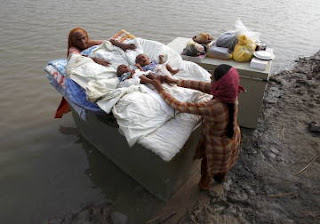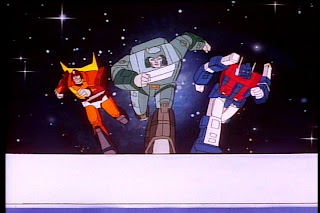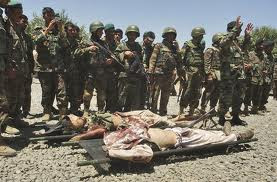1. Imagine a poetry reading in a house that is being robbed.
2. Imagine a poetry reading in which the reader, the audience, and the people in the house are all being robbed and the reading continues.
3. Imagine this reading a number of times.
4. Imagine the reading beginning to take on the content of these surroundings.
5. Imagine the reading beginning to take on the form of these surroundings.
6. Imagine the reading beginning to move like a house.
7. Imagine that there is an interval in which the robber is going out to rob the house, and his own house is left empty.
8. Imagine poetry enters this house.
9. What, at this point, is a poem?
Friday, December 31, 2010
Griftopia
Best holiday reading so far: Matt Taibbi's Griftopia, a seething account of the financial industry and the "long con that is breaking America."

Taibbi, in addition to explaining the gritty details of credit default swaps and commodity futures speculation, does things like title his chapter on Alan Greenspan "The Biggest Asshole in the Universe," coming up with simple, angry, broadly engaging frames for how our economic system works. The lesson of Taibbi's frames is that as complex as these cons were to pull off, the story of them is in fact very simple: the American financial elite, with the help of government de- and re-regulators, has spent the last 25 years either a) exploiting everyday Americans at a high-stakes casino tilted ridiculously in their favor, or b) flat-out robbing us. The only hope left for our nation's economy, now, (with an eviscerated production and public sector) seems to be that these foxes and bullies will outfox and outbully the financial elite of other nations, and that some of that resultant wealth will trickle down to us.
If this sounds cynical, it's because it is. The American economy has built itself more and more entirely on what Taibbi describes as a kind of elaborate shell-game: with things going to shit long-term, who in the short-term can vacuum up what wealth is left? It's important to note, as Taibbi does, that this creates two real political parties: the Grifter class, and...everyone else. What's brilliant about the Tea Party, from the standpoint of this Grifter class, is that it diverts the potential consciousness of the non-grifters (us), turning substantive grievances against the economic elite (them) into moral grievances against a "cultural elite" ("liberals," urban social planners) and a cultural non-elite (poor minorities and immigrants).** This mobilizes the exploited against the even-more exploited—a classic and horrendously effective strategy of powerful groups throughout history.
What the Tea Party phenomenon (and the whole Democrats v. Republicans thing more generally) misses is that, ideologically, we're not playing on mid-twentieth century terrain anymore, where government regulation = socialism = Stalinism = Hitler (and, for that matter, Republicans = "small government"). By thinking in such anachronistic terms, the screen is set up behind which 21st-century-style domination and unfreedom can continue to take place. The end-game of Tea-Partyers and Republicans (and some Democrats) is not to institute "less" government, but to institute a government that, by selectively "not interfering" in certain sectors (while happily interfering in others), enables and empowers a new class of Dominators. This is the Grifter class, and it includes everyone from Dick Cheney to Lloyd Blankfein (CEO of Goldman Sachs) to Glenn Beck to Larry Summers to Sarah Palin to, yes, Barack Obama.

I look forward to seeing who, in the next cycle of political candidates (and spectacle-addicted media coverage), will offer a narrative as candid and forceful and clear as Taibbi's. Because the real we—the not-grifter-class; those without big vacuums—are really, really fucked. Our only hope is to build up viable resistance movements—electoral or otherwise.
On this note, here are three national organizations that are helping build the fight against the Grifter class. Join them. And provide links to others in the comment threads below.
http://demandprogress.org/mission
http://movetoamend.org/
http://other98.com/
**"Revolt of the Elites," in the most recent issue of n+1, illustrates the consequences of an attack on one of these elites (the cultural elite) and not the other.

Taibbi, in addition to explaining the gritty details of credit default swaps and commodity futures speculation, does things like title his chapter on Alan Greenspan "The Biggest Asshole in the Universe," coming up with simple, angry, broadly engaging frames for how our economic system works. The lesson of Taibbi's frames is that as complex as these cons were to pull off, the story of them is in fact very simple: the American financial elite, with the help of government de- and re-regulators, has spent the last 25 years either a) exploiting everyday Americans at a high-stakes casino tilted ridiculously in their favor, or b) flat-out robbing us. The only hope left for our nation's economy, now, (with an eviscerated production and public sector) seems to be that these foxes and bullies will outfox and outbully the financial elite of other nations, and that some of that resultant wealth will trickle down to us.
If this sounds cynical, it's because it is. The American economy has built itself more and more entirely on what Taibbi describes as a kind of elaborate shell-game: with things going to shit long-term, who in the short-term can vacuum up what wealth is left? It's important to note, as Taibbi does, that this creates two real political parties: the Grifter class, and...everyone else. What's brilliant about the Tea Party, from the standpoint of this Grifter class, is that it diverts the potential consciousness of the non-grifters (us), turning substantive grievances against the economic elite (them) into moral grievances against a "cultural elite" ("liberals," urban social planners) and a cultural non-elite (poor minorities and immigrants).** This mobilizes the exploited against the even-more exploited—a classic and horrendously effective strategy of powerful groups throughout history.
What the Tea Party phenomenon (and the whole Democrats v. Republicans thing more generally) misses is that, ideologically, we're not playing on mid-twentieth century terrain anymore, where government regulation = socialism = Stalinism = Hitler (and, for that matter, Republicans = "small government"). By thinking in such anachronistic terms, the screen is set up behind which 21st-century-style domination and unfreedom can continue to take place. The end-game of Tea-Partyers and Republicans (and some Democrats) is not to institute "less" government, but to institute a government that, by selectively "not interfering" in certain sectors (while happily interfering in others), enables and empowers a new class of Dominators. This is the Grifter class, and it includes everyone from Dick Cheney to Lloyd Blankfein (CEO of Goldman Sachs) to Glenn Beck to Larry Summers to Sarah Palin to, yes, Barack Obama.

I look forward to seeing who, in the next cycle of political candidates (and spectacle-addicted media coverage), will offer a narrative as candid and forceful and clear as Taibbi's. Because the real we—the not-grifter-class; those without big vacuums—are really, really fucked. Our only hope is to build up viable resistance movements—electoral or otherwise.
On this note, here are three national organizations that are helping build the fight against the Grifter class. Join them. And provide links to others in the comment threads below.
http://demandprogress.org/mission
http://movetoamend.org/
http://other98.com/
**"Revolt of the Elites," in the most recent issue of n+1, illustrates the consequences of an attack on one of these elites (the cultural elite) and not the other.
Wednesday, December 22, 2010
Re-imagining poetry community, 2
Great review of Brian Kim Stefan's pamphlet Bank of America Online Banking: A Critical Evaluation in the new Sustainable Aircraft.
Monday, December 13, 2010
Tuesday, December 7, 2010
Saturday, December 4, 2010
The Austerity Myth
Great video on why we should be spending more, not less, on public services at a time like this.
(And, from the same source, a poem.)
The Watson Institute presents Mark Blyth on Austerity from The Global Conversation on Vimeo.
(And, from the same source, a poem.)
Sunday, November 28, 2010
Frank Rich
on this political season's elephant in the $$$ room.
Monday, November 22, 2010
Wednesday, November 17, 2010
Thursday, November 11, 2010
Tuesday, November 9, 2010
Swan Dive 3
I am and aim to be in middles of the storm;
when it comes and carries and takes me I will have been of you and with it;
together we will have been more and less affected by the floods.

I am so far away, from myself, now,
speaking as if I wasn't living!
While I live, it is a storm I aim to be; a middle.
Paradise blows through my teeth!
Rubbish barrels out of me,
Barrels and barrels of fossils go
into making me, and I am a living
consuming being,
being consumed.
when it comes and carries and takes me I will have been of you and with it;
together we will have been more and less affected by the floods.

I am so far away, from myself, now,
speaking as if I wasn't living!
While I live, it is a storm I aim to be; a middle.
Paradise blows through my teeth!
Rubbish barrels out of me,
Barrels and barrels of fossils go
into making me, and I am a living
consuming being,
being consumed.
Swan Dive 2
It is crucial that the angel of history can only see behind us.
Were it able to see now, fully
it would lose its instincts;
the wind would cease to feel on its wings.
Okay, stranger: the breeze has blown us together.
My childhood, now, spins away from me;
You and my childhood spin toward and away from me.

It is never not spinning; tho we tweet and tweet
(the birds themselves tweet! and I do know you)
and tweets themselves proceed from now to backwards, changing
our experience of reading (from up to down
to down to up)...
the breeze is blowing and piling everything up and up.


Were it able to see now, fully
it would lose its instincts;
the wind would cease to feel on its wings.
Okay, stranger: the breeze has blown us together.
My childhood, now, spins away from me;
You and my childhood spin toward and away from me.

It is never not spinning; tho we tweet and tweet
(the birds themselves tweet! and I do know you)
and tweets themselves proceed from now to backwards, changing
our experience of reading (from up to down
to down to up)...
the breeze is blowing and piling everything up and up.


Wednesday, November 3, 2010
Swan Dive
Poems play with our expectations. That is why we read them: to get played.
One line subverts
another: a beach becomes
a log becomes
a kitchen. The poem
builds the kitchen. Swan dive.
A man in a hot tub
riding a motorcycle, holding
a bottle of Old Spice, reading.
The logic of the commercial
is a similar logic to many contemporary American poems today, such as this Heather Christle poem. Compare.
(Look at the Heather Christle poem. Now back to me. Now back to the Heather Christle poem.)
In this case, the Old Spice Man is a forest.
Objects (and setting) swirl and mutate around
it; meaningless and meaningful and intelligible; instinctive;
neural-pathway-forming (and diverting). What is
the core of the poem? Where does the poem stand?
What does it stand for? Where does it move? What about the advertisement?
Is the ad an ad for Old Spice or for masculinity?
Is it a joke on masculinity? Does it work?
Is it a poem?
Similarly, is Christle's poem a joke on culture, or on nature?
A joke on deforesters, or tree-huggers? On me? You?
Is it an advertisement? (Do you want new windows, reader?)
Or do you want to be clean? (I make phone calls for a candidate
who refuses corporate donations over the weekend,
and am advised not to refer to the other, leading candidate;
even a mention of his name increases his chances
of victory.) What are we putting in circulation?
What new pathways do we want to create?
Every poem, and advertisement
answers this, whether it wants to or not.
This seems to be a problem, for poetry.
Still, it can enter the battle in the middle of the fray
or build up new networks from the margins
or build up new networks from the margins of the middle of the fray.
Poetry can divert us from pathways,
change pathways to take us
onto other pathways. "Verse": meaning
the turn
at the end of the row
when plowing. (Might this agricultural remnant
signal a direction for our attention?) Link
to link to link.
Consider what I find
when googling "Old Spice Man" and "poetry".
This cannot help but send me spiraling into 200 other video responses
(are these poems?), not to mention Greg Oden's blog
(these?) and now I'm back to Kanye's tweets,
which certainly play with my expectations.
(Or have I lost you out there, and are you now already spiraling?)
1. There's a layer of... Entertainment... we are entertainers and this is only TV... not the War 9:25 AM Sep 4th via web
2. There's a layer of... hey Kanye said what I was thinking 9:23 AM Sep 4th via web
3. A year later where do we stand? 9:22 AM Sep 4th via web
4. WHO BENEFITED FOR REAL PEOPLE???!!!!!!!! 9:21 AM Sep 4th via web
5. Walk with me people... let's break this down for real now. I might get in trouble again lol? 9:20 AM Sep 4th via web
6. MTV? JAY LENO? BEYONCE? ALL FORMS OF MEDIA? TAYLOR? KANYE WEST? Who gained? Who lost? 9:19 AM Sep 4th via web
7. You've got the Media play... Who benefitted off of the moment? 9:16 AM Sep 4th via web
I do not expect this, from a celebrity!
(I expect a celebrity; that is why I go online and surf through junk
and poetry...) The amount, and directness
and style of the tweets is unexpected! Kanye West
is a poet?
He speaks truths. (Not truth to power,
but power away from untruth?)
Conclusion: our celebrities are our poets?
They have our attention and direct
or redirect it daily.
If there are poems, today, they are an advertisement, spoken by a celebrity, away from untruth. They are the rerouting
of power and of untruth; the plowing and replowing of pathways...
(Not row to row, but link to link to link...)
“Hello, ladies. Look at your poem, now back to me, now back at your poem, now back to me. Sadly, it isn’t me, but if it stopped sounding like a poem and switched to me, it could smell like it’s me. Look down, back up, where are you? You’re on a boat with the poem your poem could smell like. What’s in your hand, back at me. I have it, it’s an oyster with two tickets to that thing you love. Look again, the tickets are now diamonds. Anything is possible when your poem smells like South Africa. I’m on a horse.”
What cruel, twisted creek would our great moral writers of the past find us up!
(In their time, too, atrocity was all around them, and yet they wrote and wrote and wrote.)
What paddles would they have to give us?
What if it wasn't cruel?
I take my paddle from Kanye;
He manufactures paddles daily with his throat.
His fingers fiddle away at pathways;
I wish to be a jumbo paddle up his throat.
Workers fiddle away at pathways;
I am a culture worker whose hook is in my throat.
The great moral writers of the past might sense our situation;
they would be of our situation, utterly, and sense
how to correctly intervene
in time.
IX. A Klee painting named ‘Angelus Novus’ shows an angel looking as though he is about to move away from something he is fixedly contemplating. His eyes are staring, his mouth is open, his wings are spread. This is how one pictures the angel of history. His face is turned toward the past. Where we perceive a chain of events, he sees one single catastrophe which keeps piling wreckage and hurls it in front of his feet. The angel would like to stay, awaken the dead, and make whole what has been smashed. But a storm is blowing in from Paradise; it has got caught in his wings with such a violence that the angel can no longer close them. The storm irresistibly propels him into the future to which his back is turned, while the pile of debris before him grows skyward. This storm is what we call progress. (Walter Benjamin)
1. There's a layer of... Entertainment... we are entertainers and this is only TV... not the War 9:25 AM Sep 4th via web
2. There's a layer of... hey Kanye said what I was thinking 9:23 AM Sep 4th via web
3. A year later where do we stand? 9:22 AM Sep 4th via web
4. WHO BENEFITED FOR REAL PEOPLE???!!!!!!!! 9:21 AM Sep 4th via web
Should we use Old Spice Body Wash?
You tell me.
I can only see behind us.

One line subverts
another: a beach becomes
a log becomes
a kitchen. The poem
builds the kitchen. Swan dive.
A man in a hot tub
riding a motorcycle, holding
a bottle of Old Spice, reading.
The logic of the commercial
is a similar logic to many contemporary American poems today, such as this Heather Christle poem. Compare.
(Look at the Heather Christle poem. Now back to me. Now back to the Heather Christle poem.)
In this case, the Old Spice Man is a forest.
Objects (and setting) swirl and mutate around
it; meaningless and meaningful and intelligible; instinctive;
neural-pathway-forming (and diverting). What is
the core of the poem? Where does the poem stand?
What does it stand for? Where does it move? What about the advertisement?
Is the ad an ad for Old Spice or for masculinity?
Is it a joke on masculinity? Does it work?
Is it a poem?
Similarly, is Christle's poem a joke on culture, or on nature?
A joke on deforesters, or tree-huggers? On me? You?
Is it an advertisement? (Do you want new windows, reader?)
Or do you want to be clean? (I make phone calls for a candidate
who refuses corporate donations over the weekend,
and am advised not to refer to the other, leading candidate;
even a mention of his name increases his chances
of victory.) What are we putting in circulation?
What new pathways do we want to create?
Every poem, and advertisement
answers this, whether it wants to or not.
This seems to be a problem, for poetry.
Still, it can enter the battle in the middle of the fray
or build up new networks from the margins
or build up new networks from the margins of the middle of the fray.
Poetry can divert us from pathways,
change pathways to take us
onto other pathways. "Verse": meaning
the turn
at the end of the row
when plowing. (Might this agricultural remnant
signal a direction for our attention?) Link
to link to link.
Consider what I find
when googling "Old Spice Man" and "poetry".
This cannot help but send me spiraling into 200 other video responses
(are these poems?), not to mention Greg Oden's blog
(these?) and now I'm back to Kanye's tweets,
which certainly play with my expectations.
(Or have I lost you out there, and are you now already spiraling?)
1. There's a layer of... Entertainment... we are entertainers and this is only TV... not the War 9:25 AM Sep 4th via web
2. There's a layer of... hey Kanye said what I was thinking 9:23 AM Sep 4th via web
3. A year later where do we stand? 9:22 AM Sep 4th via web
4. WHO BENEFITED FOR REAL PEOPLE???!!!!!!!! 9:21 AM Sep 4th via web
5. Walk with me people... let's break this down for real now. I might get in trouble again lol? 9:20 AM Sep 4th via web
6. MTV? JAY LENO? BEYONCE? ALL FORMS OF MEDIA? TAYLOR? KANYE WEST? Who gained? Who lost? 9:19 AM Sep 4th via web
7. You've got the Media play... Who benefitted off of the moment? 9:16 AM Sep 4th via web
I do not expect this, from a celebrity!
(I expect a celebrity; that is why I go online and surf through junk
and poetry...) The amount, and directness
and style of the tweets is unexpected! Kanye West
is a poet?
He speaks truths. (Not truth to power,
but power away from untruth?)
Conclusion: our celebrities are our poets?
They have our attention and direct
or redirect it daily.
If there are poems, today, they are an advertisement, spoken by a celebrity, away from untruth. They are the rerouting
of power and of untruth; the plowing and replowing of pathways...
(Not row to row, but link to link to link...)
“Hello, ladies. Look at your poem, now back to me, now back at your poem, now back to me. Sadly, it isn’t me, but if it stopped sounding like a poem and switched to me, it could smell like it’s me. Look down, back up, where are you? You’re on a boat with the poem your poem could smell like. What’s in your hand, back at me. I have it, it’s an oyster with two tickets to that thing you love. Look again, the tickets are now diamonds. Anything is possible when your poem smells like South Africa. I’m on a horse.”
What cruel, twisted creek would our great moral writers of the past find us up!
(In their time, too, atrocity was all around them, and yet they wrote and wrote and wrote.)
What paddles would they have to give us?
What if it wasn't cruel?
I take my paddle from Kanye;
He manufactures paddles daily with his throat.
His fingers fiddle away at pathways;
I wish to be a jumbo paddle up his throat.
Workers fiddle away at pathways;
I am a culture worker whose hook is in my throat.
The great moral writers of the past might sense our situation;
they would be of our situation, utterly, and sense
how to correctly intervene
in time.
IX. A Klee painting named ‘Angelus Novus’ shows an angel looking as though he is about to move away from something he is fixedly contemplating. His eyes are staring, his mouth is open, his wings are spread. This is how one pictures the angel of history. His face is turned toward the past. Where we perceive a chain of events, he sees one single catastrophe which keeps piling wreckage and hurls it in front of his feet. The angel would like to stay, awaken the dead, and make whole what has been smashed. But a storm is blowing in from Paradise; it has got caught in his wings with such a violence that the angel can no longer close them. The storm irresistibly propels him into the future to which his back is turned, while the pile of debris before him grows skyward. This storm is what we call progress. (Walter Benjamin)
1. There's a layer of... Entertainment... we are entertainers and this is only TV... not the War 9:25 AM Sep 4th via web
2. There's a layer of... hey Kanye said what I was thinking 9:23 AM Sep 4th via web
3. A year later where do we stand? 9:22 AM Sep 4th via web
4. WHO BENEFITED FOR REAL PEOPLE???!!!!!!!! 9:21 AM Sep 4th via web
Should we use Old Spice Body Wash?
You tell me.
I can only see behind us.

Tuesday, November 2, 2010
Fast Poetry
Parallel to the piece on Flarf (part 3 of 5 in my series on contemporary poetry in The Atlantic), I'll be running some more speculative posts here on the blog this week, about what it means to write poetry in high-speed, meme (and capital) driven culture.
Swan Dive.
Swan Dive.
Subscribe to:
Posts (Atom)